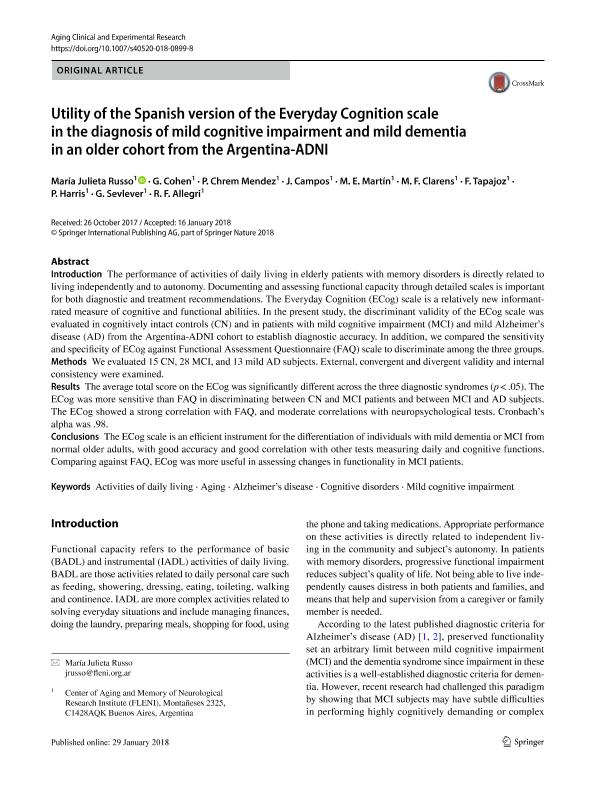Mostrar el registro sencillo del ítem
dc.contributor.author
Russo, María Julieta

dc.contributor.author
Cohen, G.
dc.contributor.author
Chrem Mendez, Patricio Alexis

dc.contributor.author
Campos, J.
dc.contributor.author
Martín, M.E.
dc.contributor.author
Clarens, M.F.
dc.contributor.author
Tapajoz Pereira de Sampaio, Fernanda

dc.contributor.author
Harris, Paula

dc.contributor.author
Sevlever, Gustavo

dc.contributor.author
Allegri, Ricardo Francisco

dc.date.available
2020-04-27T16:01:41Z
dc.date.issued
2018-01
dc.identifier.citation
Russo, María Julieta; Cohen, G.; Chrem Mendez, Patricio Alexis; Campos, J.; Martín, M.E.; et al.; Utility of the Spanish version of the Everyday Cognition scale in the diagnosis of mild cognitive impairment and mild dementia in an older cohort from the Argentina-ADNI; Editrice Kurtis S R L; Aging Clinical And Experimental Research; 30; 10; 1-2018; 1167-1176
dc.identifier.issn
1594-0667
dc.identifier.uri
http://hdl.handle.net/11336/103625
dc.description.abstract
Introduction: The performance of activities of daily living in elderly patients with memory disorders is directly related to living independently and to autonomy. Documenting and assessing functional capacity through detailed scales is important for both diagnostic and treatment recommendations. The Everyday Cognition (ECog) scale is a relatively new informant-rated measure of cognitive and functional abilities. In the present study, the discriminant validity of the ECog scale was evaluated in cognitively intact controls (CN) and in patients with mild cognitive impairment (MCI) and mild Alzheimer?s disease (AD) from the Argentina-ADNI cohort to establish diagnostic accuracy. In addition, we compared the sensitivity and specificity of ECog against Functional Assessment Questionnaire (FAQ) scale to discriminate among the three groups. Methods: We evaluated 15 CN, 28 MCI, and 13 mild AD subjects. External, convergent and divergent validity and internal consistency were examined. Results: The average total score on the ECog was significantly different across the three diagnostic syndromes (p < .05). The ECog was more sensitive than FAQ in discriminating between CN and MCI patients and between MCI and AD subjects. The ECog showed a strong correlation with FAQ, and moderate correlations with neuropsychological tests. Cronbach?s alpha was .98. Conclusions: The ECog scale is an efficient instrument for the differentiation of individuals with mild dementia or MCI from normal older adults, with good accuracy and good correlation with other tests measuring daily and cognitive functions. Comparing against FAQ, ECog was more useful in assessing changes in functionality in MCI patients.
dc.format
application/pdf
dc.language.iso
eng
dc.publisher
Editrice Kurtis S R L

dc.rights
info:eu-repo/semantics/openAccess
dc.rights.uri
https://creativecommons.org/licenses/by-nc-sa/2.5/ar/
dc.subject
ACTIVITIES OF DAILY LIVING
dc.subject
AGING
dc.subject
ALZHEIMER&RSQUO;S DISEASE
dc.subject
COGNITIVE DISORDERS
dc.subject
MILD COGNITIVE IMPAIRMENT
dc.subject.classification
Otras Ciencias de la Salud

dc.subject.classification
Ciencias de la Salud

dc.subject.classification
CIENCIAS MÉDICAS Y DE LA SALUD

dc.title
Utility of the Spanish version of the Everyday Cognition scale in the diagnosis of mild cognitive impairment and mild dementia in an older cohort from the Argentina-ADNI
dc.type
info:eu-repo/semantics/article
dc.type
info:ar-repo/semantics/artículo
dc.type
info:eu-repo/semantics/publishedVersion
dc.date.updated
2020-02-18T16:06:21Z
dc.journal.volume
30
dc.journal.number
10
dc.journal.pagination
1167-1176
dc.journal.pais
Italia

dc.description.fil
Fil: Russo, María Julieta. Fundación para la Lucha contra las Enfermedades Neurológicas de la Infancia; Argentina
dc.description.fil
Fil: Cohen, G.. Fundación para la Lucha contra las Enfermedades Neurológicas de la Infancia; Argentina
dc.description.fil
Fil: Chrem Mendez, Patricio Alexis. Fundación para la Lucha contra las Enfermedades Neurológicas de la Infancia; Argentina
dc.description.fil
Fil: Campos, J.. Fundación para la Lucha contra las Enfermedades Neurológicas de la Infancia; Argentina
dc.description.fil
Fil: Martín, M.E.. Fundación para la Lucha contra las Enfermedades Neurológicas de la Infancia; Argentina
dc.description.fil
Fil: Clarens, M.F.. Fundación para la Lucha contra las Enfermedades Neurológicas de la Infancia; Argentina
dc.description.fil
Fil: Tapajoz Pereira de Sampaio, Fernanda. Consejo Nacional de Investigaciones Científicas y Técnicas; Argentina. Fundación para la Lucha contra las Enfermedades Neurológicas de la Infancia; Argentina
dc.description.fil
Fil: Harris, Paula. Fundación para la Lucha contra las Enfermedades Neurológicas de la Infancia; Argentina. Consejo Nacional de Investigaciones Científicas y Técnicas; Argentina
dc.description.fil
Fil: Sevlever, Gustavo. Fundación para la Lucha contra las Enfermedades Neurológicas de la Infancia; Argentina. Consejo Nacional de Investigaciones Científicas y Técnicas; Argentina
dc.description.fil
Fil: Allegri, Ricardo Francisco. Consejo Nacional de Investigaciones Científicas y Técnicas; Argentina. Fundación para la Lucha contra las Enfermedades Neurológicas de la Infancia; Argentina
dc.journal.title
Aging Clinical And Experimental Research

dc.relation.alternativeid
info:eu-repo/semantics/altIdentifier/url/http://link.springer.com/10.1007/s40520-018-0899-8
dc.relation.alternativeid
info:eu-repo/semantics/altIdentifier/doi/http://dx.doi.org/10.1007/s40520-018-0899-8
Archivos asociados
